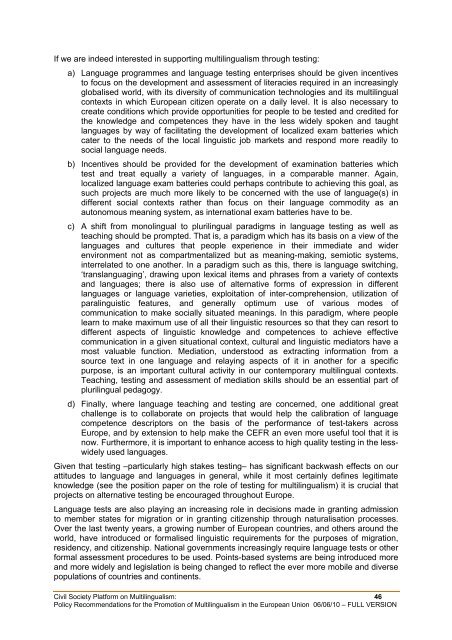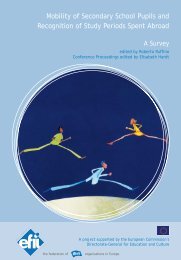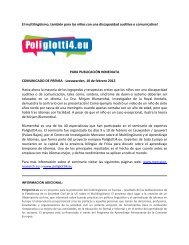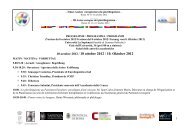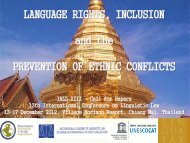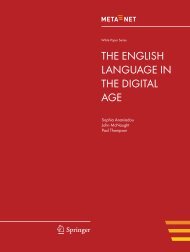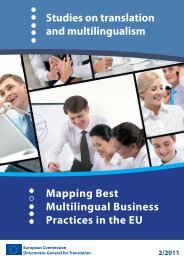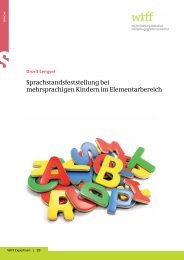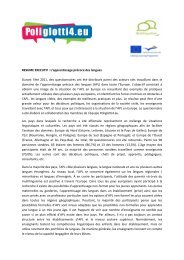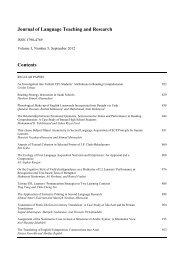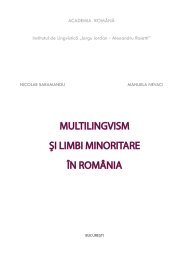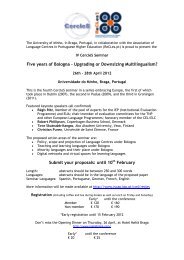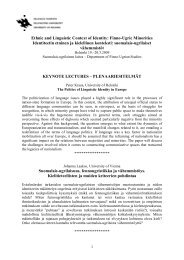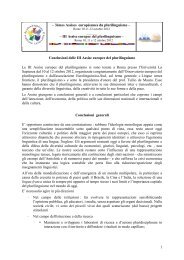FULL VERSION - European Commission - Europa
FULL VERSION - European Commission - Europa
FULL VERSION - European Commission - Europa
You also want an ePaper? Increase the reach of your titles
YUMPU automatically turns print PDFs into web optimized ePapers that Google loves.
If we are indeed interested in supporting multilingualism through testing:a) Language programmes and language testing enterprises should be given incentivesto focus on the development and assessment of literacies required in an increasinglyglobalised world, with its diversity of communication technologies and its multilingualcontexts in which <strong>European</strong> citizen operate on a daily level. It is also necessary tocreate conditions which provide opportunities for people to be tested and credited forthe knowledge and competences they have in the less widely spoken and taughtlanguages by way of facilitating the development of localized exam batteries whichcater to the needs of the local linguistic job markets and respond more readily tosocial language needs.b) Incentives should be provided for the development of examination batteries whichtest and treat equally a variety of languages, in a comparable manner. Again,localized language exam batteries could perhaps contribute to achieving this goal, assuch projects are much more likely to be concerned with the use of language(s) indifferent social contexts rather than focus on their language commodity as anautonomous meaning system, as international exam batteries have to be.c) A shift from monolingual to plurilingual paradigms in language testing as well asteaching should be prompted. That is, a paradigm which has its basis on a view of thelanguages and cultures that people experience in their immediate and widerenvironment not as compartmentalized but as meaning-making, semiotic systems,interrelated to one another. In a paradigm such as this, there is language switching,‘translanguaging’, drawing upon lexical items and phrases from a variety of contextsand languages; there is also use of alternative forms of expression in differentlanguages or language varieties, exploitation of inter-comprehension, utilization ofparalinguistic features, and generally optimum use of various modes ofcommunication to make socially situated meanings. In this paradigm, where peoplelearn to make maximum use of all their linguistic resources so that they can resort todifferent aspects of linguistic knowledge and competences to achieve effectivecommunication in a given situational context, cultural and linguistic mediators have amost valuable function. Mediation, understood as extracting information from asource text in one language and relaying aspects of it in another for a specificpurpose, is an important cultural activity in our contemporary multilingual contexts.Teaching, testing and assessment of mediation skills should be an essential part ofplurilingual pedagogy.d) Finally, where language teaching and testing are concerned, one additional greatchallenge is to collaborate on projects that would help the calibration of languagecompetence descriptors on the basis of the performance of test-takers acrossEurope, and by extension to help make the CEFR an even more useful tool that it isnow. Furthermore, it is important to enhance access to high quality testing in the lesswidelyused languages.Given that testing –particularly high stakes testing– has significant backwash effects on ourattitudes to language and languages in general, while it most certainly defines legitimateknowledge (see the position paper on the role of testing for multilingualism) it is crucial thatprojects on alternative testing be encouraged throughout Europe.Language tests are also playing an increasing role in decisions made in granting admissionto member states for migration or in granting citizenship through naturalisation processes.Over the last twenty years, a growing number of <strong>European</strong> countries, and others around theworld, have introduced or formalised linguistic requirements for the purposes of migration,residency, and citizenship. National governments increasingly require language tests or otherformal assessment procedures to be used. Points-based systems are being introduced moreand more widely and legislation is being changed to reflect the ever more mobile and diversepopulations of countries and continents.Civil Society Platform on Multilingualism: 46Policy Recommendations for the Promotion of Multilingualism in the <strong>European</strong> Union 06/06/10 – <strong>FULL</strong> <strong>VERSION</strong>


